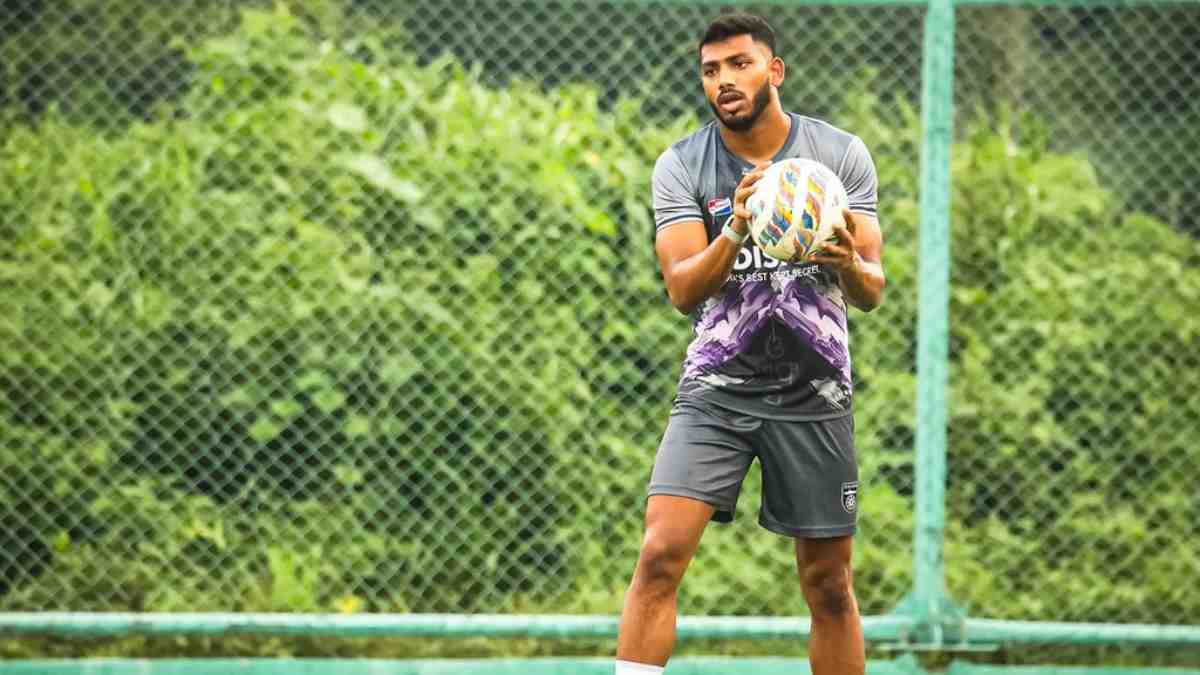With a historic 2022 UEFA Women’s Euro now over, it’s time to reflect and celebrate 11 top players in our team of the tournament.
In a tournament which saw record total crowd attendance of 574,865 spectators, 95 goals and a first title for hosts – England following a tense final against Germany plus various records broken, there has been plenty to saviour on and off the pitch.
It therefore has been incredibly difficult to single out 11 top players for a team of the tournament XI because the talent on display has been absolutely outstanding, even if some teams fell below expectations overall compared to others who exceeded pre-tournament predictions.
On that note, those who feature in our XI have just had the edge in different ways from quiet hard-working performances to consistency and perfectly-timed talent showcased on the European stage.
Now without further ado, here is our 2022 UEFA Women’s Euro XI followed by individual explanations per positions.

Goalkeeper – Mary Earps (England)

Although there has been criticism levelled at various goalkeepers across the tournament, Belgium’s Nicky Evrard and Netherlands’ Daphne van Domselaar have both impressed especially in their Quarter-Final losses to Sweden and France respectively.
England’s Mary Earps however has been just unbelievable because although she didn’t have much to do during the Lionesses’ domination of Group A, she has somehow risen to the occasion in the knockout stages with plenty of crucial saves.
Her finest performance though came in the semi-final against Sweden as she denied Sofia Jakobsson just 20 seconds into the match, before pulling off several pivotal saves including a well-time flicked clearance of Stina Blackstenius’ volleyed strike from a corner.
It is therefore impossible to snub Earps because she has just been exceptional in her proper first major tournament, having been mainly on the fringes of the goalkeeping selection in recent seasons until Wiegman arrived and appointed her as the first-choice goalkeeper.
Right-Back – Lucy Bronze (England)

No right-back throughout the tournament has come close to the quality displayed by England’s Lucy Bronze, who has been just exceptional to watch across all six of the Lionesses’ matches.
Whether it’s her technical overlapping ability on the right flank, ball recoveries, crosses or providing goalscoring threats from various set pieces, Bronze has been just absolutely awesome to watch because she has quietly performed in both defensive and attacking aspects of her role.
Bronze has also been involved in goals with two assists and a stunning semi-final header to boot, underlining just how influential she has been within England’s overall performances which often frustrated the tactics of opponents like Norway, Sweden and Germany.
Centre-Back – Leah Williamson (England), Marina Hegering (Germany)
Although there have been several top defensive performances across the tournament from players like; Millie Bright, Wendie Renard and Irene Paredes to name just a few, England’s Leah Williamson has been a quiet defensive rock across the entire competition.
Aside from showing incredible leadership skills whenever England encountered difficult opposition, Williamson has also dug in defensively to record 56 ball recoveries without making a single tackle which is simply impressive for a central defender.
Germany’s Marina Hegering meanwhile has more than matched Williamson in talent and quality in her recoveries of the ball, yet has delivered more aggression when defending with six tackles and played a crucial part in Germany’s defence throughout a tough campaign.
Left-Back – Sakina Karchaoui (France)
Out of all positions within a footballing team, the left-back role hasn’t really featured many stand-out performances with Spain’s Mapi Leon and England’s Rachel Daly just amongst a handful of top performers in that position.
France’s Sakina Karchaoui though just had the edge in my opinion because she quietly showed excellent athleticism across the left flank, as evidenced by how involved she was defensively compared to other left-backs yet just as solid when creating attacks from crosses for her teammates.
The left-back position though has arguably been a weak position which needs improving if an European team is to stand a strong chance at winning the World Cup next summer.
Midfield – Keira Walsh (England), Ella Toone (England), Lina Magull (Germany)
Coming into this tournament, the midfield section certainly looked set to be fiercely competitive and it certainly lived up to that expectation, with midfield often playing crucial roles in the outcome of matches across the competition.
England’s Keira Walsh in particular stood out because she delivered consistent all-round performances throughout the tournament, in which she got stuck in defensively when needed and still provided that crucial link to turning defence into attack with three excellent assists.
Walsh’s efforts consequently deserves maximum credit because she has just quietly got on with her role whilst players like Georgia Stanway and Ella Toone soaked up the credit.
Toone though also deserves her place in this XI because despite all of her six appearances coming as a substitute, she has provided incredible impact whenever she came on with attacking runs and technical ability on the ball to trouble fatigued defences.
One notable moment which demonstrated her particular skills came against Spain when she made an excellent attacking run as part of a pack, yet was able to time her position to meet Alessia Russo’s knockdown header and fire in a crucial equaliser in a comeback win.
Toone’s positioning also proved crucial in the final as she tore Germany’s defence open to pick up a stunning through ball from Walsh, which enabled her to chip in the opening goal beyond Merle Frohms and underlined her impact substitute quality.
Outside of England’s midfield, there has also been plenty of impressive performances from players like Spain’s Aitana Bonmati and France’s Grace Geyoro, yet Germany’s Lina Magull has been just had the edge across the tournament.
Despite lacking speed and distance running abilities in pace, Magull has somehow made up for those shortfalls in her technical ability, with great defensive quality like Walsh which was crucial to Germany’s tactics throughout the tournament.
Magull however has also been able to play her part in creating high-press attacking runs with 15 attempts on goal in total herself, of which she was very clinical with three goals and just two shots off target in an impressive tournament for the 27 year-old midfielder.
Forward – Beth Mead (England), Alessio Russo (England), Alexandra Popp (Germany)
The front three of the tournament basically write themselves starting with Beth Mead because there are very little superlatives left to describe her performances across the tournament to earn the Golden Boot.
From a scrappy winner against Austria to a clinical strike in their semi-final win over Sweden, Mead has been consistently brilliant in attack with her technique on the ball coupled with unbelievable pace and little selfishness in creating chances for teammates when not scoring herself.
Mead’s England teammate, Russo meanwhile can only be described as the perfect ‘impact sub’ because although her six appearances came from the bench, she has been an integral part of England’s second-half attacking press as oppositional defences tired.
Russo’s backheel goal against Sweden also epitomised the high confidence and technical ability within the England squad, whilst at the same time demonstrating how dangerous she is in oppositional boxes with her feet as well as head plus stepovers which often proved problematic for defences.
Germany’s Alexandra Popp completes this forward line-up because her story has been unbelievable in having missed the last two Euro tournaments through injury, yet she has been just clinical to watch especially in the air with four cracking headers which all deserve applauding.
My favourite goal of Popp’s was her left-footed opening strike against France in the semi-final because it was just a smashing goal, which showed her awareness in holding position and run timing to meet crosses into the box to cause chaos for oppositional goalkeepers.
Like many fans though, I was slightly disappointed to see Popp suffer an injury during warm-up for the Final because we were denied a dramatic battle for the Golden Boot between her and Mead.
Manager – Sarina Wiegman (England)

Having departed then reigning European champions – Netherlands last August to take up what many has described as an “impossible job” with England, Sarina Wiegman showed no fear as she guided the Lionesses to success and several historic moments across 25 days.
From displaying little sentiment unlike previous managers to creating an environment of unity and confidence, on top of other tweaks and blending youth and experience together, Wiegman has simply done an incredible job of managing the squad amidst pressures of a home tournament.
All those little aspects certainly showed on the pitch with a series of impressive performances across the tournament, especially in their psychology because they hardly crumbled mentally when under pressure and reacted positively to each of Wiegman’s in-game tactical tweaks.
Wiegman also achieved incredible history throughout the tournament with England, which saw her achieve four new records;
- First manager in men or women’s UEFA Euro to name an unchanged starting line-up all tournament.
- First manager to win consecutive UEFA Women’s Euro with different nations of which both were hosts.
- Most goals scored in a single tournament by one team, host nation and eventual champion (22).
- Biggest win in men or women’s UEFA Euro – 8-0 v Norway in second group match.
Throw in the fact that she missed the Lionesses’ victory over Northern Ireland in their final group match due to self-isolation after testing positive for Coronavirus, it says everything about the impact she has had that the team can perform without her presence in the dugout if needed.
One striking aspect of Wiegman’s personality which sticks out is her humility because she has carried grace and humbleness throughout the tournament, especially when speaking to media about her players, their performances whilst managing growing expectations of fans across the UK.
Ultimately her experience of guiding the Dutch to title success on home soil in 2017 proved crucial for a team full of confidence, yet she translated that experience and psychological expectation management to her players which prevented typical English egotism from seeping into mindsets.
Now, England have ended their 56-year wait for a major trophy across men and women’s competitions and that is down to Wiegman’s experience and managerial quality, so it’s hard to name any other coach as manager of the tournament.





















Discussion about this post